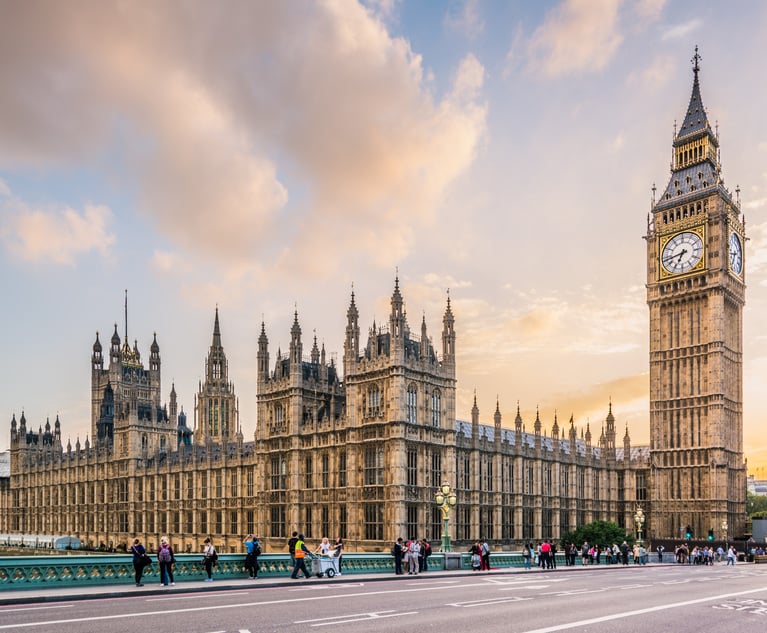Deputy PM lays out plan to overhaul 'laughing stock' libel laws
The coalition Government looks set to overhaul the UK's libel laws after Deputy Prime Minister Nick Clegg today (7 January) set out plans to bring in new defamation laws and end 'libel tourism'. In a speech on freedom of information and civil liberties given at the Institute for Government earlier today, Clegg said the Government intends to publish a draft defamation bill in the spring to enhance freedom of speech and end the practice of so-called libel tourism. Libel tourism involves foreign claimants exploiting the UK's rigorous laws by bringing cases against overseas publications to the UK courts.
January 07, 2011 at 11:05 AM
2 minute read
The coalition Government looks set to overhaul the UK's libel laws after Deputy Prime Minister Nick Clegg today (7 January) set out plans to bring in new defamation laws and end 'libel tourism'.
In a speech on freedom of information and civil liberties given at the Institute for Government earlier today, Clegg said the Government intends to publish a draft defamation bill in the spring to enhance freedom of speech and end the practice of so-called libel tourism.
Libel tourism involves foreign claimants exploiting the UK's rigorous laws by bringing cases against overseas publications to the UK courts.
The new bill is expected to provide a new statutory defence for those speaking out in the public interest, as well as providing clarification around the existing defences of fair comment and justification.
Clegg (pictured) said: "It is a farce – and an international embarrassment – that the American Congress has felt it necessary to legislate to protect their citizens from our libel laws. This Government wants to restore our international reputation for free speech… Our aim is to turn English libel laws from an international laughing stock to an international blueprint."
Clegg also highlighted the high costs of defamation proceedings, referencing the consultation on proposals by Lord Justice Jackson to reform civil litigation funding.
Commenting on the plans, Berwin Leighton Paisner media partner Ian De Freitas said: "There has recently been a lot of court-based debate on these topics and it will be very welcome to have some clarification from the Government on issues such as qualified privilege and fair comment."
"However, in terms of what has been branded 'libel tourism', I hope that they will not take legislation too far as, while there have been cases in the English courts that maybe should not have been, the courts were beginning to address this themselves.
"It is important, especially now that news is spread to a large extent via the internet, that the English court continues to have jurisdiction for cases brought by foreign nationals who genuinely have a reputation to protect here."
This content has been archived. It is available through our partners, LexisNexis® and Bloomberg Law.
To view this content, please continue to their sites.
Not a Lexis Subscriber?
Subscribe Now
Not a Bloomberg Law Subscriber?
Subscribe Now
NOT FOR REPRINT
© 2025 ALM Global, LLC, All Rights Reserved. Request academic re-use from www.copyright.com. All other uses, submit a request to [email protected]. For more information visit Asset & Logo Licensing.
You Might Like
View All
Malaysia’s Shearn Delamore Set To Expand Local Footprint With New Office Launch


CMA Uses New Competition Powers to Investigate Google Over Search Advertising

‘A Slave Drivers' Contract’: Evri Legal Director Grilled by MPs
Trending Stories
Who Got The Work
J. Brugh Lower of Gibbons has entered an appearance for industrial equipment supplier Devco Corporation in a pending trademark infringement lawsuit. The suit, accusing the defendant of selling knock-off Graco products, was filed Dec. 18 in New Jersey District Court by Rivkin Radler on behalf of Graco Inc. and Graco Minnesota. The case, assigned to U.S. District Judge Zahid N. Quraishi, is 3:24-cv-11294, Graco Inc. et al v. Devco Corporation.
Who Got The Work
Rebecca Maller-Stein and Kent A. Yalowitz of Arnold & Porter Kaye Scholer have entered their appearances for Hanaco Venture Capital and its executives, Lior Prosor and David Frankel, in a pending securities lawsuit. The action, filed on Dec. 24 in New York Southern District Court by Zell, Aron & Co. on behalf of Goldeneye Advisors, accuses the defendants of negligently and fraudulently managing the plaintiff's $1 million investment. The case, assigned to U.S. District Judge Vernon S. Broderick, is 1:24-cv-09918, Goldeneye Advisors, LLC v. Hanaco Venture Capital, Ltd. et al.
Who Got The Work
Attorneys from A&O Shearman has stepped in as defense counsel for Toronto-Dominion Bank and other defendants in a pending securities class action. The suit, filed Dec. 11 in New York Southern District Court by Bleichmar Fonti & Auld, accuses the defendants of concealing the bank's 'pervasive' deficiencies in regards to its compliance with the Bank Secrecy Act and the quality of its anti-money laundering controls. The case, assigned to U.S. District Judge Arun Subramanian, is 1:24-cv-09445, Gonzalez v. The Toronto-Dominion Bank et al.
Who Got The Work
Crown Castle International, a Pennsylvania company providing shared communications infrastructure, has turned to Luke D. Wolf of Gordon Rees Scully Mansukhani to fend off a pending breach-of-contract lawsuit. The court action, filed Nov. 25 in Michigan Eastern District Court by Hooper Hathaway PC on behalf of The Town Residences LLC, accuses Crown Castle of failing to transfer approximately $30,000 in utility payments from T-Mobile in breach of a roof-top lease and assignment agreement. The case, assigned to U.S. District Judge Susan K. Declercq, is 2:24-cv-13131, The Town Residences LLC v. T-Mobile US, Inc. et al.
Who Got The Work
Wilfred P. Coronato and Daniel M. Schwartz of McCarter & English have stepped in as defense counsel to Electrolux Home Products Inc. in a pending product liability lawsuit. The court action, filed Nov. 26 in New York Eastern District Court by Poulos Lopiccolo PC and Nagel Rice LLP on behalf of David Stern, alleges that the defendant's refrigerators’ drawers and shelving repeatedly break and fall apart within months after purchase. The case, assigned to U.S. District Judge Joan M. Azrack, is 2:24-cv-08204, Stern v. Electrolux Home Products, Inc.
Featured Firms
Law Offices of Gary Martin Hays & Associates, P.C.
(470) 294-1674
Law Offices of Mark E. Salomone
(857) 444-6468
Smith & Hassler
(713) 739-1250








